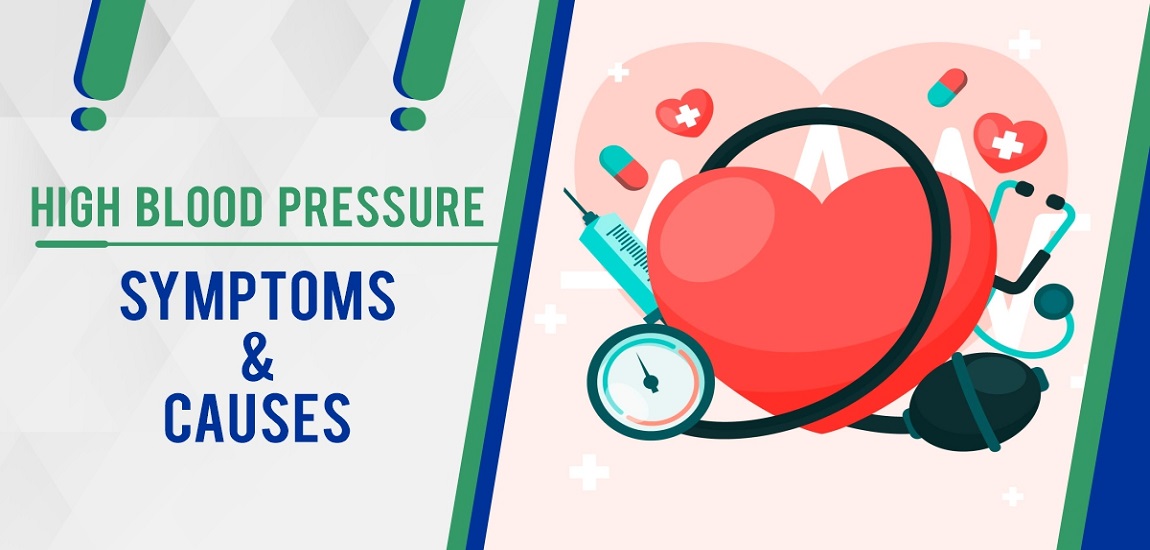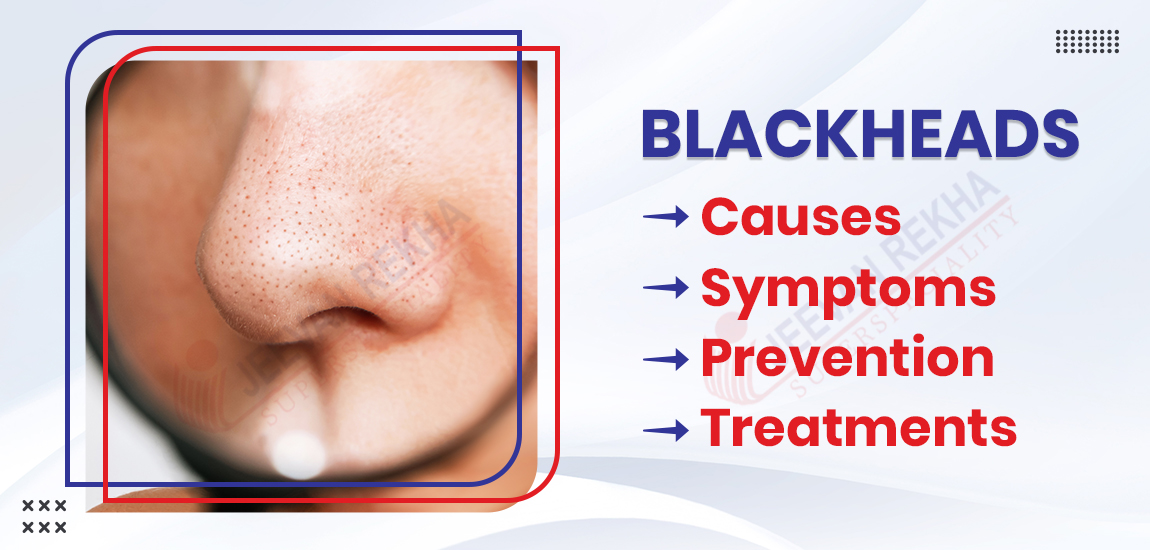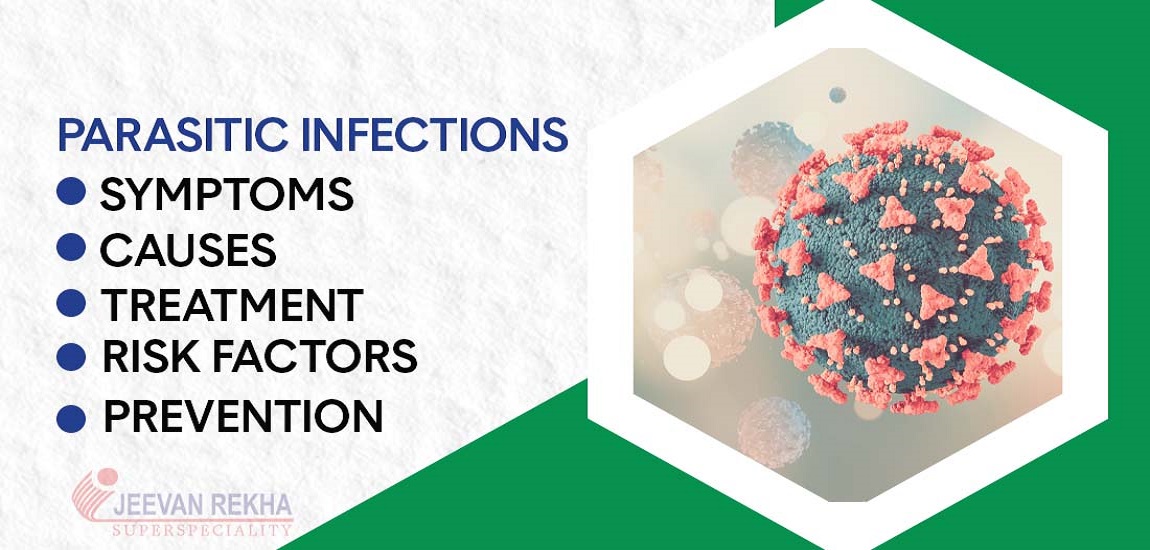
- By JRSH Admin
- In Health and Tips,
- Posted March 30, 2022
High blood pressure (Hypertension) - Symptoms and Causes
The force or pressure exerted by blood against the walls of blood highways is known as blood pressure. However, the walls of your blood vessels are continually under pressure if you have high blood pressure. High blood pressure is known as the "silent killer" since you may not realize that the product is wrong, but the damage is passing inside your body.
Your systolic blood pressure measures the pressure on the blood vessel walls as your heart beats or contracts. As the heart slows down, the diastolic blood pressure drops to the bottom. In your blood pressure reading, there are two integers.
Systolic and diastolic readings are used to determine blood pressure. As a result, BP120/80 mm Hg denotes a systolic of 120 and a diastolic of 80.
Categories of Blood Pressure
Blood pressure can be categorized into five different types, namely:
|
Category |
Systolic (mmHg) |
Diastolic (mmHg) |
Management |
|
Normal |
120 or less |
80 or less |
N/A (Healthy range) |
|
Elevated |
120-129 |
80 or fewer |
High blood pressure can develop in people with elevated blood pressure unless steps are taken to control it. |
|
Hypertension stage I |
130-139 |
80-89 |
The doctor may prescribe medications to lower blood pressure as well as some lifestyle changes to reduce the risk of heart disease |
|
Hypertension stage II |
140-159 |
90-99 |
Medications and lifestyle changes may be prescribed by doctors. |
|
Hypertensive crisis |
180 or higher |
120 or higher |
This is a serious condition that requires immediate action or aid. |
What Are the Symptoms and Signs of Hypertension?
If you have had hypertension for a while, you might not notice any symptoms. Some have described it as a silent killer. Estimates suggest that one in five individuals with high blood pressure is unaware that it is a major risk factor for stroke and heart attack.
Still, high blood pressure can harm the heart and rotation, the lungs, If undressed. Those with extremely high blood pressure may have symptoms of high blood pressure. The following are some of the signs and symptoms of exorbitantly high blood pressure
- Severe headaches
- High
- Fatigue or confusion
- Vision problems
- Casket pain
- Difficulty breathing
- Irregular twinkle
- Blood in the urine
- Pounding in your casket, neck, or cognizance.
Other symptoms may be linked to high blood pressure, according to some people. They might not be, however.
- Dizziness,
- Unease,
- Sweating,
- Trouble resting,
- Facial flushing,
- blood spots in the eyes (subconjunctival hemorrhage).
Causes of Hypertension:
High blood pressure comes in two forms.
Primary (essential) hypertension:
High blood pressure is a mystery to many people. Hypertension that develops slowly over several years is primary hypertension.
Secondary hypertension:
Some people have high blood pressure because of an underlying health condition. Hypertension secondary to initial hypertension appears suddenly and results in higher blood pressure than original hypertension. Different forms and drugs can result in
- Obstructive sleep apnea,
- Kidney disease,
- Adrenal gland tumors,
- Thyroid problems,
- Congenital defects in blood vessels,
- Birth control pills, cold treatments, decongestants, over-the-counter pain relievers, and several prescription pharmaceuticals are examples of such medications.
- Illegal drugs, such as cocaine and amphetamines
Risk Factors of hypertension:
High BP can be caused by a variety of factors, including
- Age. Having high blood pressure increases as you get older. The risk of high blood pressure for men is higher than for women until they reach the age of 64. High blood pressure is more common in women over 65.
- History of the family. If there is a family history of high blood pressure, you are also at risk of having it.
- Overweight or obese is a term used to describe someone who is overweight or obese. You weigh more when you need more blood to deliver oxygen and nutrients to your tissues. When blood flows through your blood vessels increases, the pressure on the artery walls increases.
- You are not engaging in any physical activity. People who are inactive have greater heart rates. Your heart rate increases when your heart works harder during each contraction, and when your arteries are pushed greater distances. Not exercising can also increase your heart rate.
- You are a tobacco user. Your arteries can also be damaged by tobacco chemicals. A short-term rise in blood pressure is caused by smoking or chewing tobacco. A constricted artery may cause heart disease.
- Potassium deficiency in your diet. Sodium levels in the body are kept in check by potassium in your diet. Sodium levels in the body are kept in check by potassium in your diet. A diet low in potassium can lead to high blood sodium levels, as can dehydration or other health problems that cause potassium loss.
- You're consuming far too much alcohol. The blood pressure of women who consume more than one drink or that of men who consume more than two drinks per day may increase. Heavy drinking over time might damage your heart.
- Certain chronic illnesses. Diabetic disorders, kidney disease, and sleep apnea are among chronic health conditions that may raise your blood pressure.
Diagnosing high blood Pressure:
To diagnose hypertension, all you need to do is take your blood pressure. Blood pressure is usually checked as part of a routine visit to the Jeevan Rekha Superspeciality Hospital.
If your blood pressure is high, our doctor may ask for further readings over the course of a few days or weeks. A diagnosis of hypertension is rarely made after just one class.
Our doctor will need to see proof of a long-term issue. Your surroundings, such as the stress you can feel at the doctor's cabin, might contribute to high blood pressure.
If your blood pressure remains high, your doctor will likely prescribe more tests to rule out any underlying problems. These tests may involve the following:
- Other blood tests include cholesterol screening
- An electrocardiogram (EKG, often known as an ECG) is a test that measures the electrical activity of your heart.
- An ultrasound of your heart or kidneys is also a test that measures the electrical activity of your heart.
- At home, use a blood pressure monitor to track your blood pressure for 24 hours.
These tests might help your doctor figure out whether you have any secondary conditions that are causing your high blood pressure. They can also look at how high blood pressure affects your organs.
Treatment options for high blood Pressure:
At Jeevan Rekha Superspeicality hospital, our doctor uses a number of factors to identify the best treatment option for you. Two of these concerns are the type of hypertension you have and the causes that have been found.
Primary hypertension treatment options:
If your doctor diagnoses you with primary hypertension, you may be able to lower your blood pressure by making lifestyle adjustments. If lifestyle modifications aren't enough, your doctor may prescribe medication if the lifestyle adjustments aren't working.
Secondary hypertension treatment options:
A doctor will tailor your treatment based on the condition that is causing your hypertension. The doctor will test other medications that do not cause high blood pressure if the medicine you are taking is causing it.
Even when the underlying cause of hypertension is treated, hypertension may still persist. In this case, your doctor might work with you to make lifestyle changes and prescribe medications to help you lower your blood pressure.
Many people go through a trial-and-error process when it comes to blood pressure medications. Before one or a combination of medications works for you, your doctor may need to test a number of medications.
Medication for hypertension
- You will feel your heart beating slower and less forcefully when you take beta-blockers. This lowers blood pressure by reducing the volume of blood pumped through your arteries with each beat. It also inhibits the production of certain hormones that can raise blood pressure.
- High sodium levels and extra fluid in the body can cause blood pressure to rise. Diuretics can help. Diuretics, sometimes known as water tablets, help the kidneys eliminate excess sodium from the body. When the sodium in your bloodstream exits, the extra fluid in your system passes through your urine, lowering your blood pressure.
- ACE inhibitors are drug medication that prevents the tightening and narrowing of arteries leading to lower blood pressure.
- Angiotensin II receptor blockers (ARBs): Unlike ACE inhibitors, which prevent angiotensin from binding to receptors, ARBs prevent angiotensin from binding to receptors. Relaxing blood vessels and lowering blood pressure, reduces blood pressure.
- Blockers of calcium channels: These drugs prevent some calcium from entering your heart's muscles. The result is a weaker heartbeat and lower blood pressure. They also relax blood vessels and reduce blood pressure even further, causing them to relax even more.
Home remedies for high blood Pressure:
Maintaining a healthy lifestyle can help you maintain a good blood pressure level. Heart disease and stroke can be caused by high blood pressure. Make the following healthy living behaviors a part of your daily routine:
- Eat a Healthy Diet
Keep your blood pressure under control by choosing a healthy meal and snack options. Make it a point to consume a wide range of fresh fruits and vegetables. Consult your doctor about consuming a range of foods that are high in potassium, fiber, and protein while being low in sodium (sodium) and saturated fat. Making these healthy changes can help many people lower their blood pressure and reduce their risk of heart disease and stroke.
- Keep Yourself at a Healthy Weight
You are more likely to develop high blood pressure if you are obese or overweight. Body mass index (BMI) is an important way for doctors to determine your weight range. If you know your height and weight, you can calculate your BMI on your smartphone. In addition, doctors may use hip and waist measurements when determining body fat.
- Actively participate in sports.
Being physically active provides a higher edge in fighting against Hypertension. As it helps to maintain our metabolism and blood flow in our body.
- Smoking is not permitted.
As a result of smoking, your blood pressure rises, increasing the risk of heart attack or stroke. You may be able to quit smoking with the help of your doctor.
- Limit How Much Alcohol Do You Consume?
Consumption of a large amount of alcohol assists you in raising your blood pressure. Men should limit themselves to two alcoholic beverages each day, while women should limit themselves to one.
- Get Enough Sleep
Getting adequate sleep is important for your overall health, as well as for the health of your heart and blood vessels. Sleep deprivation has been related to an increased risk of heart disease, hypertension, and stroke.
What are the effects of high blood pressure on the body?
Among all other, Blood pressure mainly affect the heart. Excessive pressure can cause arteries to stiffen, limiting blood and oxygen flow to the heart and brain. The combination of high blood pressure and decreased blood flow can lead to
Damage to the arteries:
Atherosclerosis is characterized by arteries that are flexible, robust, and elastic. Their inner lining is smooth, allowing blood to flow easily and provide nutrition and oxygen to critical organs and tissues.
High blood pressure (hypertension) causes the force of blood to flow through the arteries to gradually increase.
- Damaged and constricted arteries are possible side effects of hypertension.
- Aneurysm
Damage to the heart:
Many cardiac disorders, including coronary artery disease, can be caused by high blood pressure.
- The heart's left side is enlarged.
- Heart failure.
Damage to the brain:
A healthy blood supply is required for the brain to function properly. High blood pressure can have the following effects on the brain:
- Transient ischemic attack (TIA).
- Stroke.
- Dementia.
- Mild cognitive impairment.
Damage to the kidneys:
Kidneys are responsible for filtering excess fluid and waste from the blood, which necessitates the maintenance of healthy blood vessels. High blood pressure can harm blood vessels and cause kidney damage. Diabetes, combined with high blood pressure, might exacerbate the problem.
High blood pressure can induce a variety of kidney disorders.
- Kidney scarring (glomerulosclerosis).
- Kidney failure.
Damage to the eyes:
The tiny, delicate blood arteries that provide blood to the eyes can be damaged by high blood pressure, resulting in
- damage to the retina's blood vessels (retinopathy),
- Fluid buildup under the retina (choroidopathy),
- Nerve damage (optic neuropathy).
Sexual dysfunction:
- As men reach the age of 50, the inability to have and sustain an erection (erectile dysfunction) becomes more common. Blood flow to the penis can be obstructed by high blood pressure, which causes limited blood flow. Men with high blood pressure, on the other hand, are more prone to have erectile dysfunction.
- Sexual dysfunction can also be a side effect of high blood pressure in women. Reduced vaginal blood flow can cause decreased sexual desire or arousal, as well as vaginal dryness and trouble achieving climax.
Tags
Blog Search
Latest Posts
-
बर्ड फ्लू के लक्षण, कारण, उपचार और बचाव के उपाय जानें
December 04, 2025 -
Best Diet Plan for Menopause Weight Management
November 25, 2025 -
Pulmonary Fibrosis Treatment: Understanding Lung Scarring and Breathing Problems
November 21, 2025 -
Arrhythmia: Types, Causes, Symptoms, and Treatment
November 07, 2025 -
Silent Heart Attack: Causes, Symptoms and Treatment
October 24, 2025




